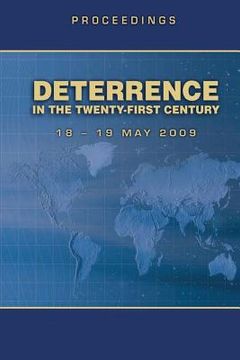Reseña del libro "Deterrence in the Twenty-First Century - Proceedings 18-19 May 2009 (en Inglés)"
Deterrence has long been a cornerstone of interaction among states. This was especially true when state interests clashed and when political leaders sought to avoid direct military conflict. In traditional deterrence relationships, calculations of military, economic, and diplomatic power determined the degrees of deterrence effectiveness. This seemed to change with the advent of the Cold War. The potential destructiveness of nuclear weapons combined with the relatively small numbers of states that possessed them suggested a need for new concepts of deterrence tailored to govern the nuclear competition among the Soviet Union, the United States, and their allies. Deterrence thinking came to mean nuclear deterrence-and as the Cold War wound down, there was a general perception that the absence of nuclear confrontation among the great powers required less emphasis on deterrence as a key feature of national strategy and a corresponding decrease in the instruments of deterrence that had prevailed during the Cold War. As the collapse of the superpower confrontation became more distant, however, states began to confront threats that were present during the Cold War but were perceived to be less important- what some have termed lesser included threats. These threats involved state failure, mass migration of populations, and drug, small arms, and human trafficking. Also included were environmental and humanitarian disasters, traditional state competition, proliferation of weapons of mass destruction and their components, and the emergence of nonstate actors empowered by new communication and information technologies that give them global reach. Taken individually, few of these threats have the potential to overthrow established and functioning states-especially in the developed world. However, these threats present challenges that policy makers struggle to meet using traditional diplomacy. Economic sanctions and incentives have exerted little apparent effect toward solving some of these post-Cold War challenges. In the end, states-and particularly the United States and its partners and allies-relied on military intervention to cope with an increasingly complex set of challenges and crises. To help understand and begin to develop alternative policy frameworks that fit the current and emerging security context, the US Air Force's Air Force Research Institute (AFRI), the Royal United Services Institute (RUSI), and King's College, London, hosted a two-day conference at the RUSI offices in London on 18 and 19 May 2009. We sought to bring together some of the best thinkers on deterrence to examine how to reinvigorate this essential tool for today's policy community. The conference exceeded our expectations, as readers will observe from the excellent products in these proceedings. From the pre-conference "thought pieces" by RUSI's Michael Codner and AFRI's Adam Lowther-the presentations by the keynote speakers and case study developers-to the post-conference "Quick Looks" by AFRI personnel, the outcome reflects the creativity and the seriousness with which the attendees and the planning staffs approached the topic. We see this conference as a beginning conversation that has the potential to inform policy makers on how to develop richer options for coping with the increasingly complex and lethal security challenges of the world in which we live. We are grateful to the participants and to those who contributed to the success of the endeavor.

